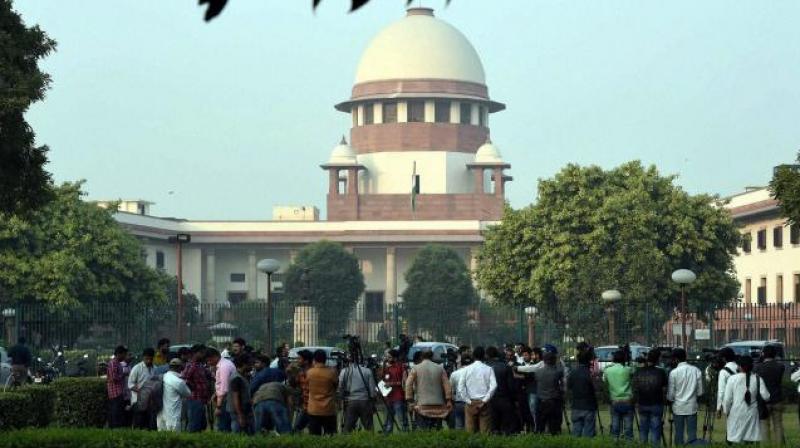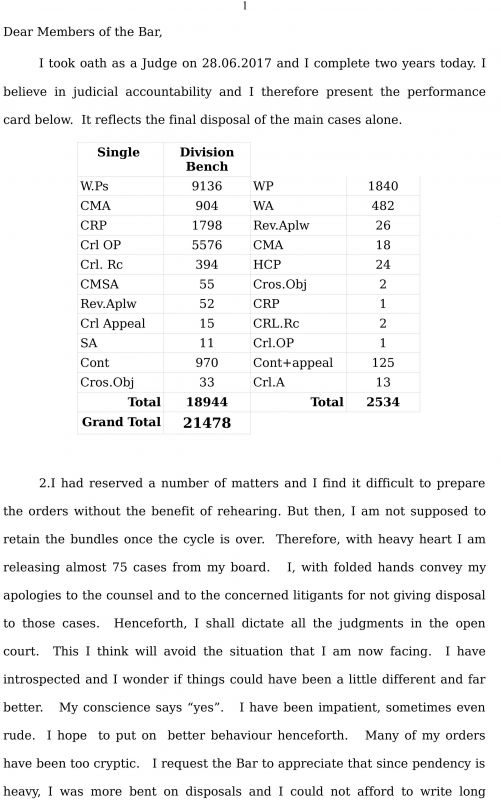In letter to the Bar, judge bares his conscience
Justice V R Krishna Iyer put it succinctly, “Judging may come easy. But not judging wellâ€.

There are Judges and Judges. Not one like the other. It is a rare privilege to be anointed a Judge of High court or Supreme Court. Just a thousand and more, at any one time, get to occupy the positions, from 1.3 billion of us. They get to play God, impacting our lives and properties and our present and very future.
Justice V R Krishna Iyer put it succinctly, “Judging may come easy. But not judging well”. Such random thoughts crossed the mind when a letter dated June 27 landed in my mail box.
One was stupefied by the contents of the letter. It was a candid confessional from a puisne judge of the Madras High court, sitting before Madurai Bench- Justice GR Swaminathan, now judge for 2 years since June 28, 2017. It was a self appraisal on his short tenure and critical at that. Surely, this man must have a large heart to communicate what he has.

It is a letter written to the members of the Bar. As Motilal Setalvad, nation’s first Attorney General, famously said, “Without the Bar the Bench has no place. Stronger, wiser and well prepared the Bar, the better the quality of the Bench. As the Bar, so the Bench.”
Justice Swaminathan has done well to ‘introspect’. It was Setalvad, who had always held the view, “The corridors of the Courts have ears and the judges have ears open to it”. No wonder GRSJ has been listening to the corridors, when he writes, “I have introspected and I wonder if things could have been a little different and far better. My conscience says “yes”. I have been impatient, sometimes even rude. I hope to put on better behaviour henceforth. Many of my orders have been too cryptic. I request the Bar to appreciate that since pendency is heavy, I was more bent on disposals and I could not afford to write long 2 orders. But then, the essential facts ought to have been stated. There is no excuse for skipping them over.”
Justice Cardozo said, “A Judge must be impatient. For, he should not suffer fools. He owes accountability to the higher calling viz. law not the lawyers.” GRSJ’s impatience and rudeness would not have been misplaced, if the orders he pronounced were not imbued with it but answered his legal conscience .it takes courage for a Judge of the constitutional court to say what he has. Kudos to him to yield to his pricking conscience.
At the other end of the spectrum is what Chief Justice M.C.Chagla, advocated for a ‘patient, listening judge’. “He wrote, “I believe that the administration of justice is a co-operative effort between the judge and the lawyer. It should not become a one-sided affair. There are judges who think that lawyers are superfluous. They know the law. They have studied the facts, and they can decide the question on their own. But grave injustice can be caused if such an approach were followed. Judges are there to decide after hearing counsel on both sides. But I have known judges, incredible though it may seem, who decide first, and hear counsel afterwards”. When GRSJ says that he was worried with the ‘pendency’, he has not forgotten the adage, “Despatch is important, but despatch at the cost of justice is a complete perversion of the judicial process”. Praise be to him.
While GRSJ has promised to be on ‘better behaviour’ from the bench and not be ‘rude and impatient’, the reciprocity from the lawyer community must be to exploit the ‘patient listening’. How many of us lawyers come well prepared? GRSJ says that he would allow ‘one adjournment’. But having been a practitioner himself, he would know that lawyers’ community is an old boys’ network and ‘adjournments can be fixed on mutually convenient premises’. Now that he has laid bare what he has in mind, the Bar may have to reciprocate. Otherwise GRSJ may be compelled to return to ‘rude and impatient’ routine. Bar cannot then blame the Bench.
As for his pregnant axiom, “I believe I can write a good judgment only if your advocacy is good”, GRSJ could not have zeroed in on the basic necessity. Facts control the law and not the reverse. With an outpouring of case-law which can be Googled for the asking, lawyers make it a point to pack their punches with too many citations. Chagla wrote on Sept, 30, 1973 sagaciously, what is true even to this day, “… there is a growing tendency of citing a large number of cases as authority. I do not know if the judge wants to parade his deep knowledge of the law, or whether there is a certain lack of self-confidence which makes him reluctant to decide cases without the aid of authorities. Nowadays, no proposition of law seems to be acceptable unless it is propped up by some previous decision, particularly of the Supreme Court, whether relevant or not”.
Well, GRSJ, do not worry if your orders were ‘too cryptic’, so long as they captured the essence of the issue and fell in line with the factual matrix of that case.
The Bar needs to follow the leader and not burden the Bench with too many citations.
Appropriately, this anecdotal reference to Mahatma Gandhi the lawyer in Pietermatizburg, South Africa, may capture it better. . Gandhi’s clerk was carrying an overload of authorities to the Court. The client asked Gandhi, “Sir, you were confident of my cause. Why then are you carrying so many crutches for support. Do I have a weak case?” Gandhi responded, as only he can, cheekily, “Son, all the authorities are for the Judge. You and I don’t need them.” Yes, GRSJ, we salute your offer to be descriptive not cryptic, but do not indulge us, for the sake of it, please.
One is reminded of a Judge who has already gone to meet his maker and who shall remain nameless. He used to come prepared to Court with dictated orders.
He will go through the motions of a hearing and reserve orders, to be delivered the next day. The legal fraternity had their moles to detect the result, which was a complete giveaway in the cause list of the day, with the court officer. Red ticks meant gone for good. Green ticks meant orders as prayed for. The few Yellow ticks meant Judge was undecided. Aware of these markings the cunning seniors would send their substitutes for red ticks and present themselves for the green ticks and get the yellow ticks adjourned to let the judge decide for himself.
Justice G R Swaminathan is surely one of a kind. That he has made bold to go on record of his ‘introspection’ is commendable from the litigant/citizen’s perspective. But one wonders how his brothers and sisters on the Bench take it. Judicial Accountability Commission has been a long yearned for statute. There is no worthwhile audit on the performance of a Judge on the Bench. So, a self-appraisal from a conscientious judge is more than welcome.

